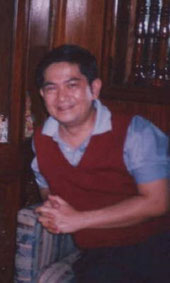A Tribute to Andres Bonifacio
Andres Bonifacio
Katipunan
On 7 July 1892, the day after Rizal's deportation was announced, Bonifacio and others founded the Katipunan, or in full, Kataastaasang Kagalanggalangang Katipunan ng mga Anak ng Bayan (“Highest and Most Respected Society of the Country's Children”). The secret society sought independence from Spain through armed revolt. It was influenced by Freemasonry through its rituals and organization, and several members, aside from Bonifacio, were also Freemasons. Within the society, Bonifacio used the pseudonym “May pag-asa” (“There is Hope”).
For a time, Bonifacio worked with both the Katipunan and La Liga Filipina. La Liga eventually split because less affluent members like Bonifacio lost hope for peaceful reform, and stopped their monetary aid. Wealthier, more conservative members who still believed in peaceful reforms set up the Cuerpo de Compromisarios, which pledged continued support to the reformists in Spain. The radicals were subsumed into the Katipunan. From Manila, the Katipunan expanded into several provinces, including Batangas, Laguna, Cavite, Bulacan, Pampanga, and Nueva Ecija. Most of its members, called Katipuneros, came from the lower and middle classes, with many of its local leaders being prominent figures in their municipalities. At first exclusively male, membership was later extended to females, with Bonifacio's wife Gregoria de Jesús as a leading member.
From the beginning, Bonifacio was one of the chief Katipunan officers, though he did not become its Supremo (supreme leader) or Presidente Supremo (Supreme President) until 1895, and he was the third head of the Katipunan after Deodato Arellano and Román Basa. Prior to this, he served as the society's comptroller and then as its fiscal. The society had its own laws, bureaucratic structure and elective leadership. For each province it involved, the Katipunan Supreme Council coordinated provincial councils in charge of public administration and military affairs and local councils in charge of affairs on the district or barrio level.
Within the society, Bonifacio developed a strong friendship with Emilio Jacinto who served as his adviser and confidant as well as a member of the Supreme Council. Bonifacio adopted Jacinto's Kartilla --- which was the official teachings of the society --- in place of his own Decalogue, which he judged as inferior. Bonifacio, Jacinto and Pio Valenzuela collaborated on the society's organ Kalayaan (Freedom), which only had one printed issue. Bonifacio wrote several pieces for the paper, including the poem “Pag-ibig sa Tinubúang Lupà” (“Love for the Homeland”) under the pseudonym Agapito Bagumbayan. The publication of Kalayaan in March 1896 led to a great increase in membership. The Katipunan movement spread throughout Luzon, to Panay in the Visayas and even as far as Mindanao. From less than 300 members in January 1896, it had about 30,000 to 40,000 by August.
The rapid increase of Katipunan activity drew the suspicion of the Spanish authorities. By early 1896, Spanish intelligence was already aware of the existence of a seditious secret society, and suspects were kept under surveillance and arrests were made. On 3 May, Bonifacio held a general assembly of Katipunan leaders in Pasig where they debated when to start their revolt. While Bonifacio wanted to revolt as soon as possible, Emilio Aguinaldo of Cavite expressed reservations due to lack of firearms. The consensus was to consult José Rizal in Dapitan before launching their revolt, and Bonifacio sent Pio Valenzuela to Rizal, who was against a premature revolution and recommended more prior preparation.
ARTICLES
Personal Articles
Andres Bonifacio: Profile of a Filipino Hero
Notes on Andres Bonifacio and the Katipunan
Bonifacio and Rizal: Of Oil and Water and Men of Conviction
Creative Commons and Public Domain Articles
Andres Bonifacio
Andres Bonifacio: Early Life and Family Background
BACK TO: Philippines Country Profile and Various Topics
philippines-atbp.jimdofree.com/philippines-part-vi-country-profile-and-various-topics/
BACK TO: A Tribute to Andres Bonifacio Main Page
philippines-atbp.jimdofree.com/about-alex-moises-andres-bonifacio-tribute/
BACK TO: Greetings and Messages - First Quarter Year 2013
philippines-atbp.jimdofree.com/about-alex-moises-greetings-messages
 Hearts Philippines & Then Some
Hearts Philippines & Then Some





